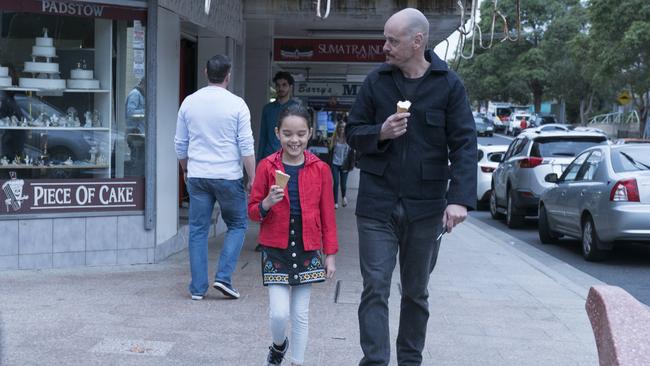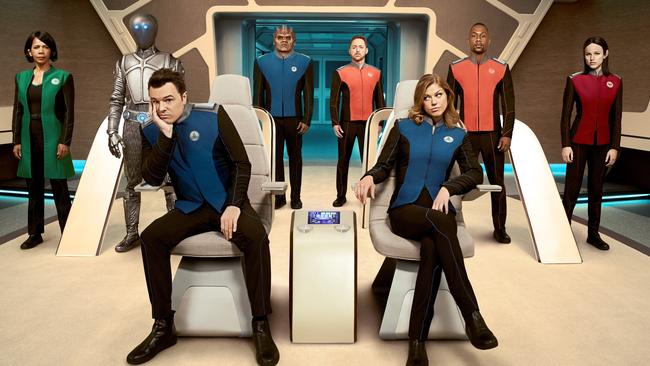Scott Ryan is Mr Inbetween; Seth McFarlane’s The Orville
Quirky humour is a counterpoint to Mr Inbetween’s confronting world in seedy Sydney.

Nash Edgerton’s new crime series Mr Inbetween has been a long time in development. It turns out to be a grim but very funny comedy built around the clear boundaries that exist between criminality and respectability, and the way the transgressive energies of life at the margins are so segregated from mainstream Australian society.
The series, from Jungle Entertainment and Blue-Tongue Films, is a follow-up to Scott Ryan’s 2004 feature The Magician, a mockumentary that introduced audiences to the world of hit man Ray Shoesmith, played by Ryan. Edgerton became interested after seeing the film at the St Kilda Film Festival and during the next few years, in collaboration with producer Michele Bennett (Chopper), worked with Ryan on the television version of the movie. Their production is the first Australian series picked up by US cable network FX, joining shows such as Fargo and American Crime Story. It’s a big deal for these local film companies.
The show is a kind of gangster melodrama, its leading protagonist again called Ray Shoesmith and played by the toothy, perpetually grinning Ryan, a lower-class figure characterised by a sometimes charming crudeness, aggressive violence and alienation from the respectable mores of society. He’s divorced from the newly religious Jacinta (Natalie Tran) and, when not at work, Ray shares custody of their eight-year-old daughter Brittany (Chika Yasumura). His relationship with his daughter forces him, in his numb way, to continually re-examine the meaning of his life.
His job is usually to work for Freddy (played in his usual creepily concise style by Damon Herriman), owner of strip club The Playhouse with its leggy, athletic pole dancers, a man with his fingers in most of Sydney’s criminal pies. His main role is making people sorry if they don’t pay what they owe the boss when they have the chance, some of them seemingly respectable professionals such as small-time businessman Terry (Kriv Stenders).
Ray is presented in a morally sympathetic light. He comes across as basically a good and decent bloke who has had to turn to crime to survive and prosper in a corrupt world where everyone around him is up to no good. He is created in the tradition of the enforcer character in pulp fiction, a specialist in an illegal and conventionally immoral profession and not always on the side of organised crime. He seems constantly at odds with incompetent underworld boss Terry, who sends him out to kill a man named Mike Hansen, whom he kidnaps and rolls in the boot of his car and eventually buries in the bush. Turns out he’s the wrong guy and life starts to close in on Ray.
He’s not the brightest but possesses a rather charming working-class sense of irony and a droll sense of humour. He has little time for society’s myths and rituals such as Christmas, Jesus or the tooth fairy, he tells his daughter, but once saw a unicorn on a trip to the Blue Mountains. He stands up for his friends, too. When his mate Gary (Justin Rosniak), set up by his brother-in-law Vasilli (Jackson Tozer), is brutally bashed after a gun sale goes wrong, a furious Ray quickly goes after the perpetrators and exacts revenge. Ray also is dedicated to his older brother Bruce (Nicholas Cassim), a former gangster who is experiencing a gradual reduction in mobility and co-ordination because of motor neurone disease.
The Sydney world Ray inhabits is presented as a kind of frontier society in which violent confrontations are part of the ordinary course of life, with predators lurking on the footpath, one-punch merchants around every corner, and the threat of criminal violence the dominant characteristic of life. When two young grifters mock him after they knock an ice cream from his daughter’s hands in a suburban street, he gently parks her in the car and goes back for retribution. Bad people need to pay for their misdemeanours.
Violence is the norm for Mr Inbetween, a test of honour and integrity, and he practises for his daily confrontations by using a punching bag in his garage, though he’s handy with a gun too.
Like any hard-boiled hero, he has his own code that transcends the law and conventional society, and he follows it with restraint and discipline. “Everyone’s got their own style,” he tells his new girlfriend, paramedic Ally (Brooke Satchwell), during their first romantic encounter. “You have to find someone who fits your style, otherwise it’s not going to work.” She also, it must be said, has a sturdy self-reliant, individualistic thing going on, a certain attractive looseness of character. We’d certainly like to see more of her as the series progresses.
The milieu Ryan and Edgerton create, a mix of endemic violence and almost surreal humour, reminded me a little of Robert G. Barrett’s Les Norton crime-caper stories, a genre he developed out of urban myths, shaggy-dog stories, the street wit and indifferent criminality of the culturally marginalised, and a shameless attitude to old jokes. He sold more than a million copies. They were written with the same evangelical fervour as his columns, exceeding the speed limits of good taste in a boozy, sometimes strangely appealing I-don’t-believe-I’m-still-reading-this narrative rush.
Edgerton has created a series that also often comically unmasks the macho myth, as the underrated Barrett did, by making it laughable, though its actors play with an impeccable, finely tuned sense of kitchen-sink realism. He directs with just the right degree of quirky, existential, humorous style to counterpoint the often dark, sardonic performances.

The Orville is Seth MacFarlane’s expensive homage to the spirit of the classic Star Trek sci-fi genre, produced for the free-to-air Fox network in the US, an affectionate and not particularly subtle interstellar soap opera propelled by some rapidly delivered, solidly sarcastic one-liners — not all of which hit the intended mark — and a lot of straight-out dumb jokes.
MacFarlane, creator of the hugely successful animated series The Family Guy, is convinced that audiences are becoming a little bored with an increasingly gritty TV landscape filled with antiheroes and regards The Orville, his first live action series, as “inviting” and the kind of “fun show” rarely seen in this age of so-called peak TV.
It’s 2418, and the Planetary Union promotes Ed Mercer, played breezily by MacFarlane, to captain of mid-level exploratory vessel the USS Orville as his last chance after months of depressive behaviour. His crew includes a mixed bag of races and nationalities. There’s navigator John LaMarr (J. Lee), passionate physician Dr Finn (Penny Johnson Jerald) and non-humans Bortus (Peter Macon), Alara Kitan (Halston Sage) and Isaac (Mark Jackson). Ed’s enthusiasm for his new position is dampened when his ex-wife, Kelly Grayson (Adrianne Palicki), is assigned to be his first officer.
A year earlier Mercer had arrived at their apartment in New York City by commuter pod, opening the door to the bedroom only to find his wife in bed with an alien named Darulio. The marriage was doomed. Now she’s his second-in-command, seemingly determined to atone, as he undertakes his first mission, a run-of-the-mill resupply assignment to science station Epsilon 2. On their arrival they discover the station’s scientists have developed something called the quantum accelerator, a device capable of accelerating time, a powerful weapon in the wrong hands. Suddenly the Orville crew is ambushed by an alien race bent on stealing the device.
The pilot episode treads a perilously thin line between rather lame comedy and tepid drama. Jon Favreau’s direction is hardly inspired, and the only standouts are Palicki’s Grayson and Scott Grimes’s Gordon Malloy. There are few buzzes, though, and little hilarity in this depressing effort.
Mr Inbetween, Monday, 8.30, Showcase.
The Orville, streaming on SBS On Demand.


To join the conversation, please log in. Don't have an account? Register
Join the conversation, you are commenting as Logout